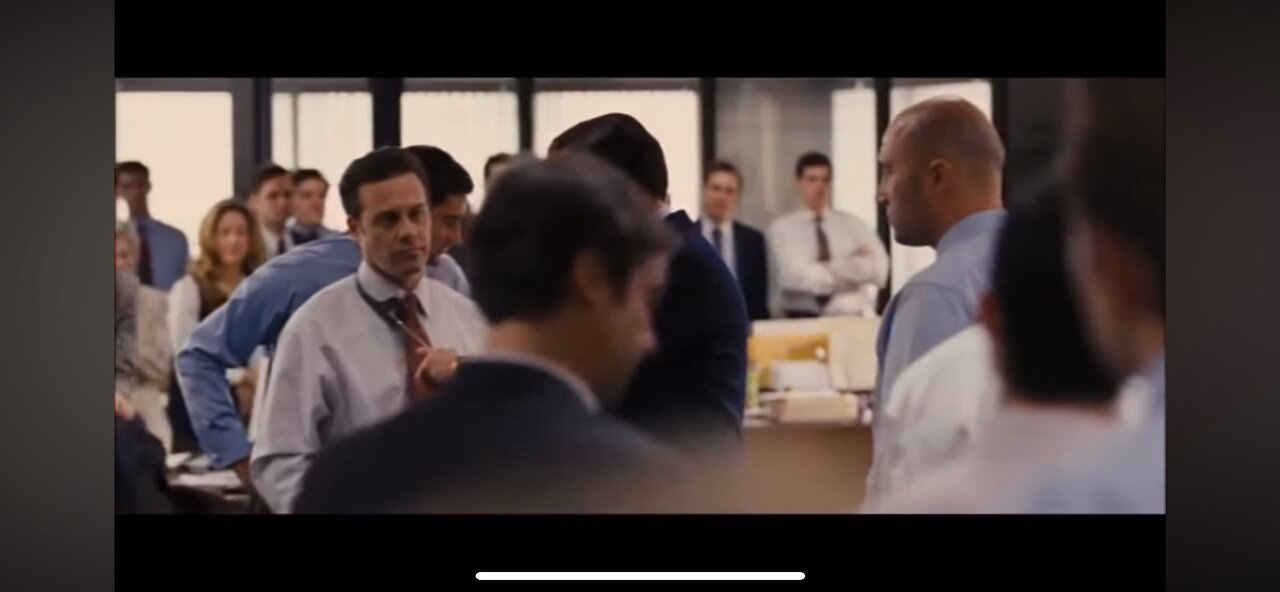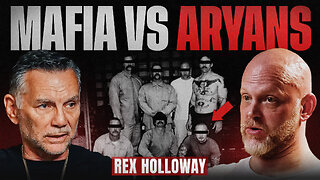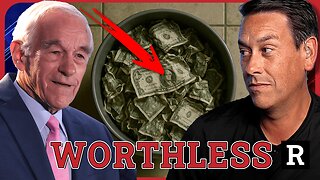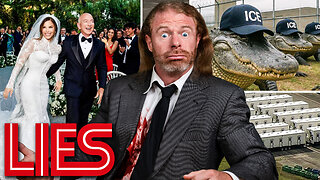Premium Only Content

*Rhetoric and Multiculturalism*
In this entry, I will apply Goldzwig’s theory of multiculturalism and rhetoric to examine the critical questions: In which ways does this artifact rhetorically demonstrate a problematic application of one's own positionality on a group they are not a part of or harmful perpetuation of a stereotype of a particular identity? Why is this problematic? To investigate these questions, I analyzed Jordan Belfort’s motivational speech to this employees at Straton in the movie The Wolf of Wall Street. Belfort (Leonardo DiCaprio) uses rhetoric to perpetuate harmful stereotypes about people who are not rich to position himself and his employees as superior and not bound by the same moral code. This is problematic because it justifies malicious and unethical business practices, and creates the narrative that becoming rich is the only way to deal with life’s problems, even if it comes at the expense of someone else.
The Wolf of Wall Street encapsulates the real-life memoire of Jordan Belfort, an ambitious and idealistic young stockbroker on Wall Street in the 80s. His character is charismatic and driven, known for his persuasive sales skills and ability to motivate his team. However, Belfort lacks an ethical boundary both in business and life, and quickly falls into a life of corruption, fraud, and excess spending. Belfort founds his own brokerage firm, Stratton Oakmont, where he and his team engage in pump-and-dump schemes and other forms of illegal activity to acrue enormous wealth.
The clip I analyze, a motivational speech Belfort gives to his employees at Stratton Oakmont, captures the overall attitude of Leonardo DiCaprio’s character and the themes of greed, immorality, and toxic ambition. In this speech, Belfort encourages his sales team to overcome their personal problems and challenges by achieving financial success. The message he tries to convey is that money can solve all problems and bring ultimate happiness, and the only way to live a fulfilled life is through the relentless pursuit of money, no matter the costs.
According to Goldzwig, in seeking modes of transformation for realizing a truly democratic society, a teacher or leader in a “classroom” must consider the forms of educational practice they have been willing to commit to and how those practices impact the audience. These four methods of teaching are seduco, reduco, deduco, and educo; each of them are derived from the Latin word “duco”, which means to teach or guide (Goldzwig, R.S.). Seduco refers to educational leadership by charisma, where the dazzling display of character by the leader is used to sway opinion. Reduco motivates the audience by promising the skills needed for success and dominance, primarily appealing to greed, competitiveness, and conquest. Students become motivated by a desire for wealth and recognition. Deduco involves a sort of automatic deduction, where one’s personal identity is stripped from them by ignoring the lived experiences of the “Other” by making the “Other” invisible. The root of this method of teaching is nihilism, or a rejection of all moral principles and acceptance of an “ends justify the means” attitude. If experience is recognized, it is quickly dismissed through the use of stereotypes and rigid categorization; experience is starkly contrasted between “us” and “those people” (Goldzwig, R.S.). When these methods become normative, as Belfort does in this artifact, they can be problematic and perpetuate harmful stereotypes.
Seduco is at play throughout Belfort’s speech through his emphatic display of charisma and passion. Charisma describes compelling attractiveness or charm that promotes devotion in others. He does this rhetorically in verbal and nonverbal ways. It is important to first note Belfort’s physical appearance. His hair is neatly slicked back and his tie is tight. He is one of the only people in the room dressed in a suit, and wears a large fancy watch. In fact, in an effort to motivate his audience to deal with their problems by becoming rich, Belfort screams, “When I have to face my problems, I show up in the back of a limo, wearing a two-thousand dollar suit, and a forty-thousand dollar gold [expletive] watch!” The overwhelming approval and receptivity to his charisma is evident in the thunderous applause of his employees after each short monologue.
Furthermore, Belfort grits his teeth, progressively increases the volume of his voice to the point of yelling, wildly pounds his mic on his head, and has everyone in the office screaming in approval within the first minute of his speech. Here, Belfort is cultivating approval and receptivity to his message by showing everyone how passionate he is about the topic of wealth accumulation. His aggressiveness can be understood as a rhetorical strategy to pass down that same passion and drive favorable financial results for Stratton Oakmont.
Belfort uses rhetoric and the reduco method of teaching to motivate his employees to achieve financial success by promising the necessary skills for success and appealing to the desire for status and wealth. Towards the end of his speech, Belfort says, “All you have to do today, is pick up that phone and speak the words that I have taught you, and I will make your richer than the most powerful CEO in the [United States of America].” This use of rhetoric works as motivation since Belfort himself is already financially successful, which gives his words more weight and his teachings more credibility in the eyes of the people of Stratton. The words that he has taught employees are understood as having the power to create wealth in and of themselves, no matter the individual backgrounds of the employees. No matter who they or their clients are, if they work for Stratton Oakmont and use the words of Jordan Belfort, they will be monumentally successful.
The Deduco method strips personal identity and ignores the lived experiences of the “Other” to make them invisible and justify nihilism (Goldzwig, S.R.). Belfort does this rhetorically by recognizing experience, but quickly dismissing it through stereotyping and rigid categorization. Belfort employs the Deduco method to draw a distinction between the rich and poor. He sets the stage in the first couple seconds when he says, “There is no nobility in poverty.” He goes on to say, “if anyone here thinks I’m superficial, or materialistic, go get a job at Mcdonald’s because that’s where you belong!” At the end, he screams at everyone, “I want you to deal with your problems by becoming rich!” Here, Belfort ignores the experiences of those outside of Stratton Oakmont, who may have to work lower wage jobs out of necessity, in order to motivate his employees. However, it is effective in reaching its goal in that it causes Stratton employees to almost resent those without money, and do anything from becoming like the “Other”.
This use of rhetoric may be productive in that it accomplishes its goal in motivating the employees of Stratton Oakmont, but ethically it raises many concerns that may render it unproductive. While there is nothing inherently wrong with wearing a nice suit and watch, using the materialistic aspect of self as a primary premise to build credibility in rhetoric is unproductive. Accumulating wealth is not a bad thing, however Belfort uses rhetoric to say that whatever one has to do to achieve this goal is fair game. Furthermore, Belfort’s rhetoric use of the reduco method is unproductive because he is not the only person who knows how to make money, especially ethically. The lofty promise of simply speaking the words he taught will render extraordinary financial success is a dramatic overstatement. Finally, the deduco method accomplishes its goal but is rhetorically unproductive ethically speaking. Playing on stereotypes of people without money, like categorizing them as fast food chain employees, is never a good premise for a logical argument rhetorically. Belfort uses rhetoric to build on and exploit these harmful stereotypes to position himself and his employees as superior to all others, thus justifying their malicious and unethical business practices. Becoming rich, to Belfort’s audience, becomes the only way of dealing with problems, and problems must be dealt with even if it is at the expense of someone else.
Felski, in her commentary on counterpublics, has given insight into how these methods of teaching in rhetoric, if left unchecked, can perpetuate and spread like a virus. Felski analyzes rhetoric by examining what rhetorically constitutes the public sphere, or dominant ideology, and what constitutes the counterpublic, or ideologies that have been looking over or discounted (Felski, R.). Felski explains that the common good has to be questioned because it does not do the critical questioning we assume it does, and is not always good for all people.
This idea applies to this artifact since Belfort uses rhetoric to motivate his employees to, essentially, achieve financial success at any cost. This obviously is harmful to clients that the employees will snake in the future. The problem with confronting this issue is that the counterpublic, the clients, may lack the power, resources, or status to bring attention to this dangerous rhetoric or the harm the firm causes. Thus, the status quo is followed until the status quo and tilted, and more people suffer as a result (Felski, R.). Within this context, the counterpublic can do little to improve their situation without recognition from the dominant public, or other firms and legal offices with strong financial backing that are willing to investigate Stratton Oakmont or call into question their use of rhetoric. On a personal level, society should continue to lobby to the dominant public to not only question the status quo, but achieve real results and change that exemplifies an ethical exchange of ideas.
-
 LIVE
LIVE
Kim Iversen
2 hours agoRon Paul Has a Warning—And No One in D.C. Wants You to Hear It
1,305 watching -
 LIVE
LIVE
Michael Franzese
51 minutes agoMafia vs. Aryan Brotherhood: Former Leader Reveals All
260 watching -
 LIVE
LIVE
The Officer Tatum
1 hour agoLIVE Alligator Alcatraz, NYC Candidate Mamdani, Idaho Shooter DEEP DIVE + MORE EP 135
1,186 watching -
 24:32
24:32
Redacted News
1 hour ago"The US Dollar is almost WORTHLESS and we are heading for a DARK COLLAPSE " Dr. Ron Paul
17K37 -
 46:14
46:14
Candace Show Podcast
1 hour agoBREAKING NEWS: I Just Got Subpoenaed By Blake Lively And Ryan Reynolds | Candace Ep 209
18K25 -
 LIVE
LIVE
Akademiks
37 minutes agoDiddy Trial Day 33: Verdict Watch! Jury Set to Deliberate and deliver Verdict!! (1/30)
1,524 watching -
 LIVE
LIVE
StoneMountain64
4 hours agoDelta Force CONSOLE and Controller FINALLY has a launch date
473 watching -
 2:08:35
2:08:35
Pop Culture Crisis
2 hours agoPixar 'ELIO' LGBTQ Erasure, Taylor Swift Tradwife Era? Dave Chappelle Dunks on DJ Khaled | Ep. 868
19.5K1 -
 1:18:29
1:18:29
Awaken With JP
4 hours agoAlligator Alcatraz and Billionaire Weddings - LIES Ep 98
108K21 -
 LIVE
LIVE
LFA TV
21 hours agoLFA TV ALL DAY STREAM - TUESDAY 7/1/25
1,241 watching